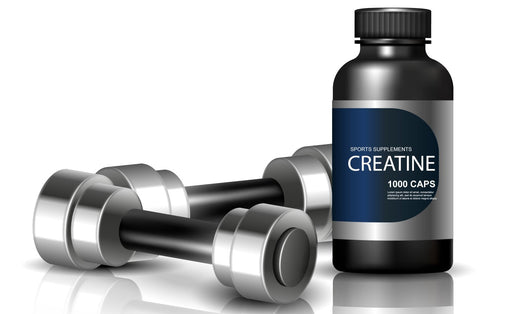
Unlocking the Power of Creatine: Uses, Safety, and Tips for Beginners
Share
Whether you're a seasoned athlete or just starting your fitness journey, you've probably heard of creatine. But what exactly is it, how does it work, and is it safe? Let’s dive into the fascinating science behind creatine, backed by research, and provide you with practical tips to incorporate it into your routine effectively.
What is Creatine?
Creatine is a naturally occurring compound found in small amounts in certain foods like red meat and fish. It's also synthesized by the body in the liver, kidneys, and pancreas from amino acids. Approximately 95% of creatine is stored in your muscles as creatine phosphate, which plays a crucial role in energy production during high-intensity activities.
The Uses of Creatine in Fitness
Creatine is one of the most researched and popular supplements in the fitness industry, celebrated for its ability to enhance performance and support muscle growth. Here’s how it can benefit you:
1. Boosts Athletic Performance
Creatine enhances the body’s ability to produce energy rapidly. This is particularly beneficial during short bursts of high-intensity activities like weightlifting, sprinting, and high-intensity interval training (HIIT). Studies have shown that creatine supplementation can improve strength, increase lean muscle mass, and aid muscle recovery (Branch, 2003).
2. Supports Muscle Growth
By increasing water content in muscle cells, creatine promotes an environment conducive to muscle growth. It also stimulates protein synthesis, which is essential for repairing and building muscle tissue (Volek et al., 1999).
3. Enhances Brain Function
Emerging research suggests that creatine may support cognitive functions such as memory and intelligence, particularly in tasks requiring quick thinking and mental endurance (Avgerinos et al., 2018).
Is Creatine Safe?
One of the most common concerns about supplements is their safety. Creatine has been extensively studied and is generally considered safe for most people when taken as recommended.
Research Findings on Safety
-
Long-Term Use: Studies spanning up to five years have shown that creatine supplementation does not adversely affect kidney or liver function in healthy individuals (Poortmans & Francaux, 1999).
-
Side Effects: The most commonly reported side effect is weight gain, primarily due to increased water retention in muscles. Some individuals may experience digestive issues, but these are typically mild and can often be mitigated by adjusting the dosage.
-
Hydration: It's essential to stay well-hydrated while taking creatine, as it draws water into the muscle cells. Adequate water intake can help prevent any potential dehydration-related issues.
Who Should Avoid Creatine?
While creatine is safe for most, individuals with pre-existing kidney or liver conditions should consult a healthcare professional before starting supplementation. Pregnant or breastfeeding women should also seek medical advice.
Tips for Beginners: How to Get Started with Creatine
Ready to incorporate creatine into your fitness regimen? Here are some beginner-friendly tips to ensure you maximize benefits while maintaining safety:
1. Choose the Right Type
The most researched and commonly used form is creatine monohydrate. It's effective and cost-efficient. Other forms like creatine ethyl ester or buffered creatine are available but don’t offer significant advantages over monohydrate.
2. Loading Phase vs. Steady Intake
- Loading Phase: Consume 20 grams per day (split into 4 doses) for 5-7 days to saturate your muscles quickly.
- Maintenance Phase: Follow up with 3-5 grams per day to maintain elevated creatine levels.
Alternatively, you can skip the loading phase and take 3-5 grams daily, achieving saturation in about three weeks with fewer side effects.
3. Timing Matters
While timing isn’t critical, taking creatine post-workout with a source of carbohydrates can enhance uptake into muscles. Pairing it with protein can also support muscle recovery.
4. Stay Hydrated
Ensure you drink plenty of water throughout the day. A good rule of thumb is to increase your usual water intake by at least 500 ml when supplementing with creatine.
5. Consistent Use
For optimal results, consistency is key. Make creatine a part of your daily routine, even on rest days, to maintain muscle saturation.
6. Monitor Your Body
Pay attention to how your body responds. If you experience any adverse effects, consider adjusting the dosage or consulting a healthcare professional.
Q&A: Your Creatine Questions Answered
Q: Can women use creatine?
A: Absolutely! Creatine is beneficial for both men and women, supporting muscle growth, strength, and overall performance.
Q: Will creatine make me bulky?
A: Creatine may lead to slight weight gain due to water retention and muscle growth, but it won't make you "bulky." It enhances lean muscle mass and improves performance.
Q: Can I cycle creatine?
A: Cycling isn’t necessary. Consistent daily intake is effective, but some prefer to cycle on and off every few months based on personal preference.
Final Thoughts
Creatine is a powerhouse supplement with a robust body of research supporting its efficacy and safety. Whether you're aiming to boost athletic performance, increase muscle mass, or enhance cognitive function, creatine can be a valuable addition to your fitness toolkit.
Remember, supplements work best when combined with a balanced diet, regular exercise, and proper hydration. Always consult with a healthcare professional before starting any new supplement regimen, especially if you have underlying health conditions.
Ready to harness the benefits of creatine? Start your journey today and unlock new levels of strength and performance!
